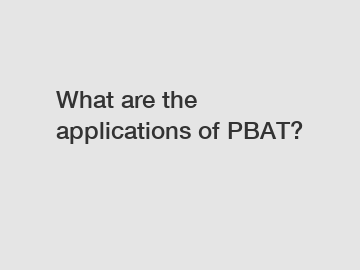What are the applications of PBAT?
What are the applications of PBAT?
PBAT, or polybutylene adipate terephthalate, is a biodegradable and compostable polymer that has gained attention in recent years due to its various applications. In this article, we will discuss the wide range of uses for PBAT, its origin, and its significance in today's world.
PBAT finds its applications in several industries, including packaging, agriculture, and personal care. In the packaging industry, PBAT is commonly used in the production of biodegradable films and bags. These films and bags offer a sustainable alternative to traditional plastic packaging, reducing the environmental impact of waste. PBAT films also possess excellent mechanical properties, such as flexibility and tear resistance, making them suitable for a wide range of packaging needs.

In agriculture, PBAT has been utilized in the development of biodegradable mulch films. These films are used to cover soil, preventing weed growth, retaining moisture, and promoting plant growth. Unlike traditional plastic mulch films, which leave behind harmful residues and contribute to plastic pollution, PBAT mulch films can be plowed into the soil at the end of the season, where they will naturally degrade without causing harm to the environment.
The personal care industry has also embraced PBAT as an eco-friendly alternative. PBAT-based materials are used in the manufacturing of feminine hygiene products, such as tampons and pads. These products provide a more sustainable solution compared to conventional options made from non-recyclable materials. PBAT's biodegradability ensures that these hygiene products do not add to the growing pile of single-use plastic waste.
The unique properties of PBAT can be attributed to its composition. PBAT is a copolymer made from four different monomers: 1,4-butanediol, adipic acid, terephthalic acid, and succinic acid. Each monomer contributes specific characteristics to the final polymer. For instance, the adipic acid and terephthalic acid promote flexibility and strength, while the succinic acid enhances biodegradability.
The process of PBAT's biodegradation occurs through microbial action. When exposed to appropriate environmental conditions, such as the presence of microorganisms, heat, moisture, and oxygen, the molecular structure of PBAT breaks down over time. This degradation process produces carbon dioxide, water, and biomass. Unlike conventional plastics, which can persist in the environment for centuries, PBAT degrades within a reasonable timeframe, reducing pollution and waste accumulation.
The significance of PBAT lies in its potential to mitigate the environmental impact associated with conventional plastics. By using PBAT in various applications, we can reduce our reliance on non-renewable resources and decrease the amount of plastic waste that ends up in landfills and oceans. PBAT offers a practical and sustainable solution that aligns with the growing demand for eco-friendly alternatives.
In conclusion, the applications of PBAT span across different industries, making it a versatile and valuable polymer. Its use in packaging, agriculture, and personal care contributes to reducing environmental pollution and waste. Furthermore, PBAT's unique composition and biodegradability set it apart from traditional plastics, highlighting its significance in promoting a more sustainable future.
Contact us to discuss your requirements of compostable PBAT plastic For packaging, pbat, compostable resin supplier. Our experienced sales team can help you identify the options that best suit your needs.


